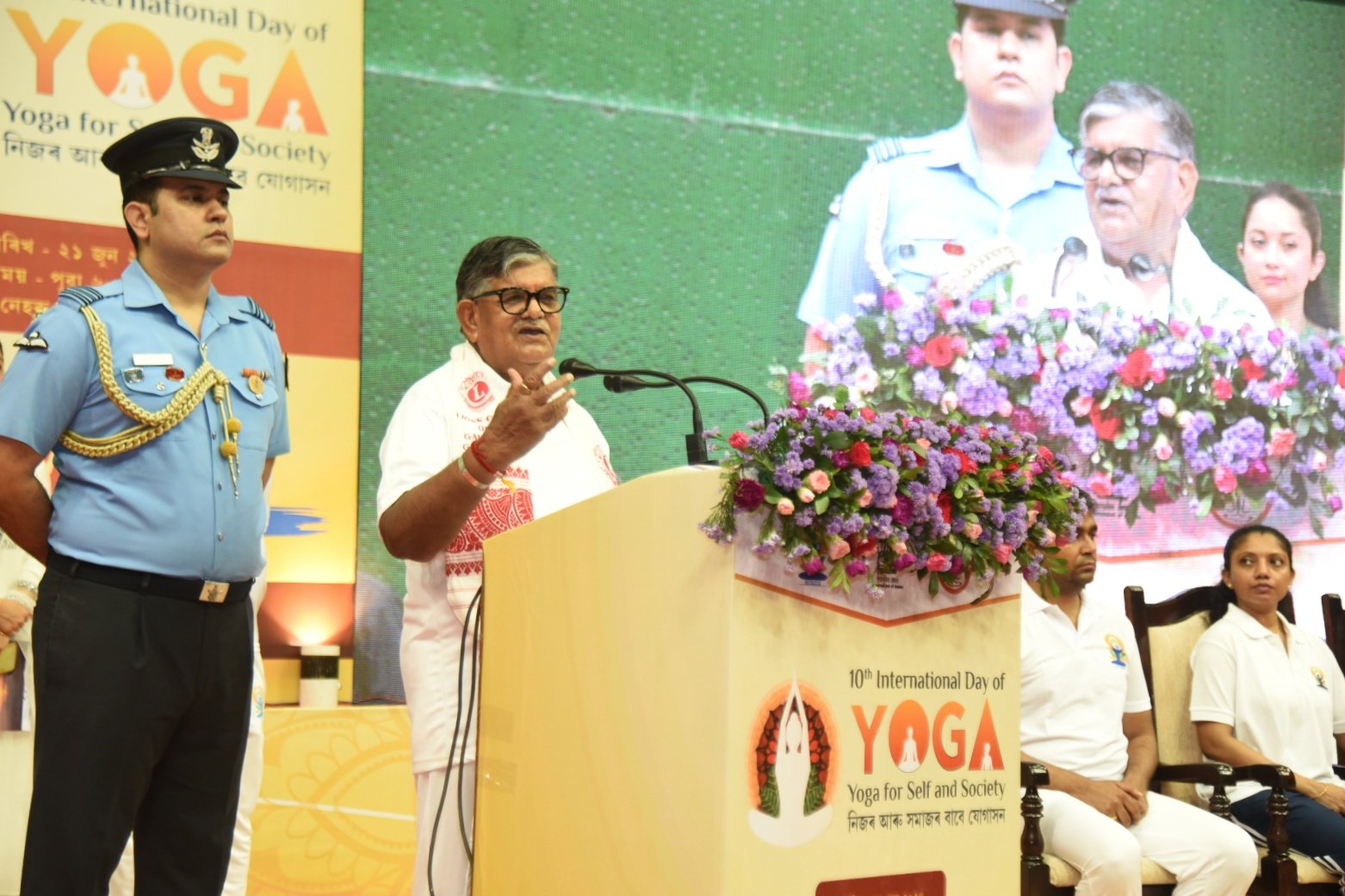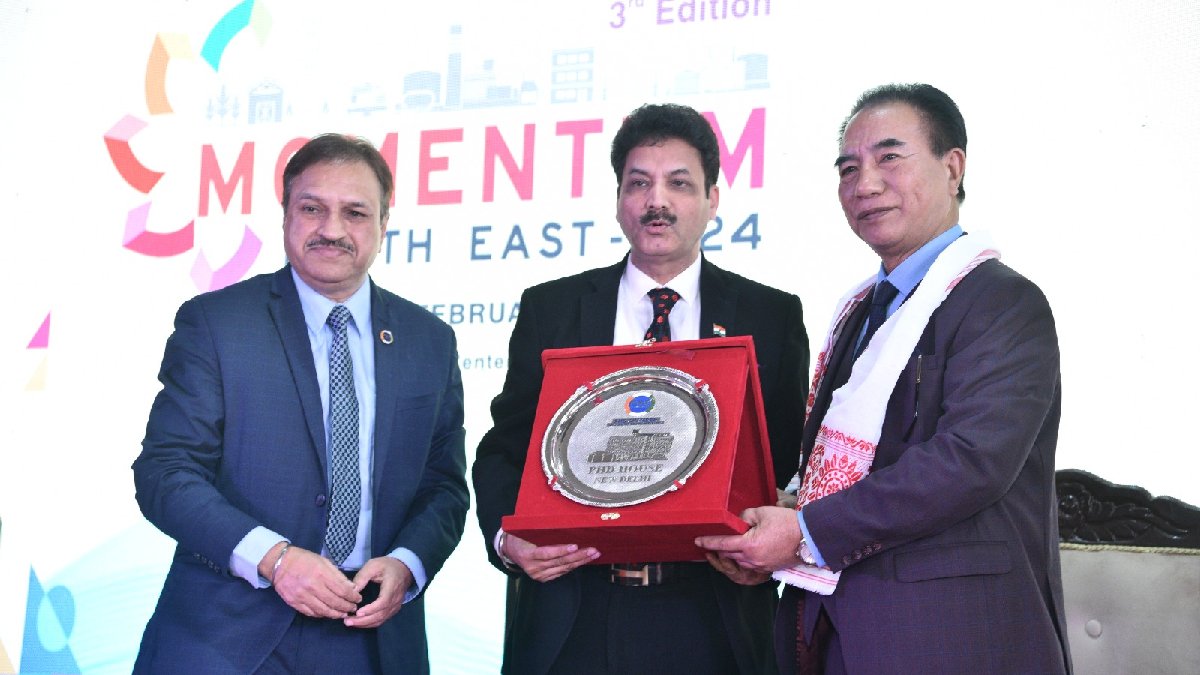HT Digital,
Guwahati, Feb 10: The 3rd day of the Momentum North East’s 3rd edition commenced with a conclave titled ‘Assam Bamboo Conclave – Sustainable Products for a Greener India’. This event was organized by Assam State Bamboo Mission in association with PHD Chamber of Commerce and Industry.
Shri Prabhat Chandra Taro, the Hon’ble Executive Member of Soil Conservation and Industries & Commerce of the Karbi Anglong Autonomous Council, graced the conclave as the Chief Guest.
Mr. Sazzad Alam, ACS, Mission Director of the Assam State Bamboo Mission, gave the welcome address while emphasizing the revolutionary role of the Mission in fostering a market friendly revolution. “Bamboo holds a special place in Assam’s heritage, with as many as 51 species growing in the region. It is not only a symbol of cultural significance but also a pillar of the local economy, providing livelihoods to cultivators and skilled artisans who craft decorative baskets, furniture, and mats. The Assam State Bamboo Mission envisions leveraging this resource to promote entrepreneurship, generate awareness of bamboo’s socio-economic benefits, and provide market linkages”, said Mr Sazzad Alam in his opening address.
Mr. Siddharth Singh, Deputy Secretary of PHDCCI, discussed the potential role of PHDCCI in fostering the development of the bamboo industry in North East India.
“Bamboo’s rapid growth rate and adaptability to various climates make it an ideal resource for reducing reliance on traditional timber, thus aiding in forest conservation efforts. This abundance of bamboo has positioned the region as a significant player in the sustainable development sector, offering a plethora of opportunities for economic growth and environmental conservation” said Mr. Siddharth Singh, Deputy Secretary of PHDCCI while discussing the development of bamboo industry in North East India.
The bamboo market in North East India has undergone a significant transformation, thanks to the innovative use of bamboo and the diverse range of bamboo products that have emerged. With 31.5 million hectares of bamboo growing worldwide, India boasts 30 percent of the global bamboo resources, making it a key player in the bamboo industry. The North East region, in particular, has harnessed this abundant resource to revolutionize its market.
Artisans in North East India have skillfully crafted a variety of bamboo products, including trays, unique furniture, decorative lamps, fans, baskets, handbags, lamp shades, and jewelry. These items not only cater to local needs but also have the potential to captivate national and international markets with their uniqueness and cultural significance.
The 1st Technical Session for today’s Conclave, themed ‘Technological Interventions required & emerging areas of Bamboo Value Chain in Assam’, witnessed an enlightening discussion. Notable speakers included Mr. Amitava Sil, Officer In-Charge at the Institute of Wood Science and Technology, Kolkata; Mr. Pulak Mandal, Deputy Manager at the North East Cane and Bamboo Development Council; and Mr. Prithviraj Neog, Assistant Manager at the North Eastern Development Finance Corporation Ltd. (NEDFi).
The 2nd Technical Session, themed ‘Opportunities and Challenges for Sustainable Development of Bamboo – The Green Gold in Assam’, saw participation from notable dignitaries. Among them were Mr. Rupjyoti Borah, Senior Extension Specialist from the Directorate of Extension Education at Assam Agriculture University, Jorhat; Mrs. Ellora Dutta Borah, Chief Technical Officer at the Rain Forest Research Institute, a part of the Indian Council of Forestry Research and Education, Jorhat; and Dr. Arup Jyoti Kalita, Consultant at the World Agroforestry Centre.
Mrs. Madhusmita Khound, Deputy Mission Director of Assam State Bamboo Mission, delivered the concluding remarks and vote of thanks while stating the bigger role of bamboo as an emerging star in the market while challenging other products through sustainable development. “This industry provides livelihoods for millions, especially in rural areas, and supports a range of artisanal and small-scale enterprises. However, the potential of bamboo extends beyond economics; it is also linked to social and environmental impacts”, said Mrs Madhusmita Khound while addressing the gathering. Following this, a valedictory session was held, and all participating stalls were felicitated.
The economic importance of bamboo in India cannot be overstated. Millions of people, especially in rural areas, rely on bamboo for their livelihood. It is a substantial source of income and resources, providing job opportunities and contributing to the country’s economy. Despite having a large share of the world’s bamboo resources, India meets only 50 percent of its domestic demand, indicating a high demand for bamboo products. The Indian bamboo market currently requires 27 million tons of bamboo annually, highlighting the vast potential for growth and development within the industry.
Bamboo’s versatility extends beyond just products; it forms the backbone of daily life in the North Eastern hilly regions. It is used in house building, making baskets, fishing traps, clothing items, construction of suspension bridges, and religious paraphernalia. There is hardly any aspect of tribal life that does not incorporate the use of indigenous plants like bamboo.
The National Bamboo Mission complements these efforts by aiming to expand bamboo cultivation across non-forest government and private lands, thereby supplementing farm income and contributing to climate resilience. The Assam Bamboo and Cane Policy of 2019 further solidifies the framework for bamboo industry development, emphasizing sustainable and scientific harvesting.
Furthermore, the development of bamboo-based technology and value-added products is propelling the industry forward. Innovations in applications such as polyhouses, electrical appliances, food, and fiber are improving the quality of life and offering new business opportunities.
The bamboo industry in North East India has seen a revolution with the creation of a wide array of bamboo products and the development of bamboo-based technologies. This has not only provided economic sustenance to millions but also positioned the region as a vital contributor to the bamboo market both domestically and globally.












